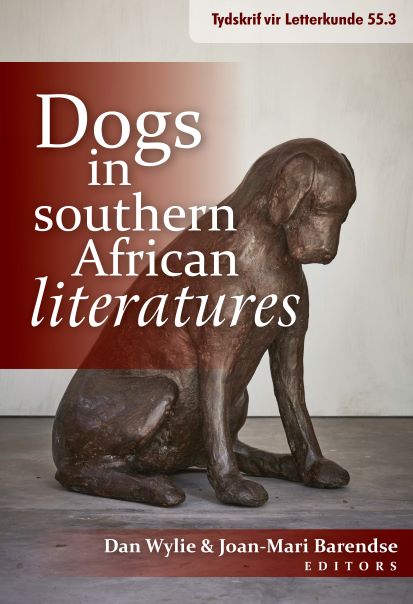History, politics and dogs in Zimbabwean literature, c.1975–2015
DOI :
https://doi.org/10.17159/2309-9070/tvl.v.55i3.5504Mots-clés :
dogs, literature, politics, ZimbabweRésumé
Zimbabwean fiction writers have engaged with dogs as objects, subjects and even actors. This essay focuses on the pivotal forty-year period between 1975 and 2015, which saw the end of white rule, the rise of an independent African state and the collapse of that state. In analysing how selected writers have variously made use of dogs, we discuss the extent to which writers deal with human-dog relations. We buttress our point by examining key pieces of fiction in which dogs appear and we unpack the extent to which fictive representations of humans and dogs approximate lived relations in pre-colonial, colonial and post-colonial settings. We show the enduring relevance of dogs as metaphors of power in the Zimbabwean political landscape. We contend that such canine allegories have a history and explore their usage by creative writers over the last forty years.
Téléchargements
Références
Bryce, Jane. “Interview with Yvonne Vera, 1 August 2000, Bulawayo, Zimbabwe: ‘Survival is in the Mouth’,”
in R. Muponde and M. Taruvinga, eds. Sign and Taboo: Perspectives on the Poetic Fiction of Yvonne
Vera. Weaver, 2002. pp. 217–226.
Chikwava, Brian. Harare North. Vintage. 2009.
Chirere, Memory. “Pursuing Garabha in Waiting for the Rain,” M. T. Vambe and M. Chirere, eds, Charles
Mungoshi: A Critical Reader, Prestige, 2006.
Fuller, Alexandra. Don’t let’s go to the dogs tonight. Random House, 2002.
Gascoigne, Michael. Tunzi the Faithful Shadow. Quest Publishing, 1988.
Ndlovu-Gatsheni, Sabelo. “Making Sense of Mugabeism in Local and Global Politics: ‘So Blair, keep your
England and let me keep my Zimbabwe.” Third World Quarterly, vol. 30, no. 6, 2009, pp. 1139–1158.
Granqvist, Raoul. “Storylines, Spellbinders and Heartbreaks: Decentering the African Oral-Popular Discourse,”
In Raoul Granqvist, ed. Major Minorities: English Literatures in Transit, Brill, 1993.
Gutu, Laetitia. “Who is Most Important,” Shumba and the He-Goat and other Stories. Mambo Press, 1978,
pp.19–23.
Henkin, Yagil. “Stoning the Dogs: Guerilla Mobilization and Violence in Rhodesia,” Studies in Conflict &
Terrorism. vol. 36, 2013, pp. 503–532.
Hove, Chenjerai. Bones. David Philip, 1988.
Hove, Chenjerai. Shadow. Heinemann, 1991.
Hove, Chenjerai. “Harare’s high fences, Neighbours and Dogs.” Shebeen Tales. College Press, 1994. pp. 19–23.
Kaarsholm, Preben. “Coming to terms with violence: literature and the development of a public sphere in
Zimbabwe,” in R. Muponde and R. Primorac, Versions of Zimbabwe: New Approaches to literature
and culture. Weaver Press, 2005. pp.3˗24.
Kohn, Eduardo. “How dogs dream: Amazonian natures and the politics of transspecies engagement.” American
Ethnologist. vol. 34, no. 1, 2007, pp. 4–24.
Lönngren, Ann-Sofie. Following the Animal: Power, Agency, and Human-Animal transformation in Modern, Northern-European Literature. Cambridge Scholars Publishing, 2015.
Mabasa, Ignatius. Mapenzi. College Press, 1999.
Mabasa, Ignatius. ImbwaYemunhu. Bhabhu Books, 2013.
Moyo, Madhlozi. “Fauna in Archaic Greek and Kalanga oral wisdom literatures,” PhD Thesis, School of Languages and Literatures, Classics, University of Cape Town, 2016.
Muchemwa, Kizito. “Some thoughts on history, memory and writing in Zimbabwe,” in R. Muponde and R. Primorac, Versions of Zimbabwe: New Approaches to literature and culture. Weaver Press, 2005, pp. 195–202.
Mumvuma, Renny. Imbwa Nyoro. Mambo Press, 1982.
Mungoshi, Charles. Waiting for the Rain. Heinemann, 1975.
Mungoshi, Charles. “The Lazy Young Man and his Dog.” In One Day Long Ago: More Stories from a Shona Childhood. Baobab Books, 1991, pp. 53–62.
Munjanja, Amos. Tsumo naMadimikira. Longman, 1965.
Musvoto, Rangarirai. “Tensions and conflicts in Zimbabwean society: Nyamubaya reminisces.” English Academy Review vol. 24, no. 1, 2007, pp. 61–70.
Ndlovu-Gatsheni, Sabelo J. “Making Sense of Mugabeism in Local and Global Politics: ‘So Blair, keep your England and let me keep my Zimbabwe.” Third World Quarterly, vol. 30 no. 6, 2009, pp. 1139–1158.
Nyamubaya, Freedom. On the Road Again. Zimbabwe Publishing House, 1986.
Primorac, Ranka. The Place of Tears: The Novel and Politics in Modern Zimbabwe. Tauris Academic Studies, 2006.
Ranger, Terence. “Nationalist Historiography, Patriotic History and the History of the Nation: the Struggle over the past in Zimbabwe,” Journal of Southern African Studies. vol. 30, no. 2, 2004. pp. 215–234.
Ranger, Terence. “Rule by historiography: The Struggle over the past in contemporary Zimbabwe,” in R. Muponde and R. Primorac, eds. Versions of Zimbabwe: New Approaches to literature and culture. Weaver, 2005, pp. 217–243.
Téléchargements
Publiée
Numéro
Rubrique
Licence
(c) Copyright Tydskrif vir Letterkunde 2018

Ce travail est disponible sous licence Creative Commons Attribution - Partage dans les Mêmes Conditions 4.0 International.


 https://orcid.org/0000-0001-6465-6584
https://orcid.org/0000-0001-6465-6584


.png)